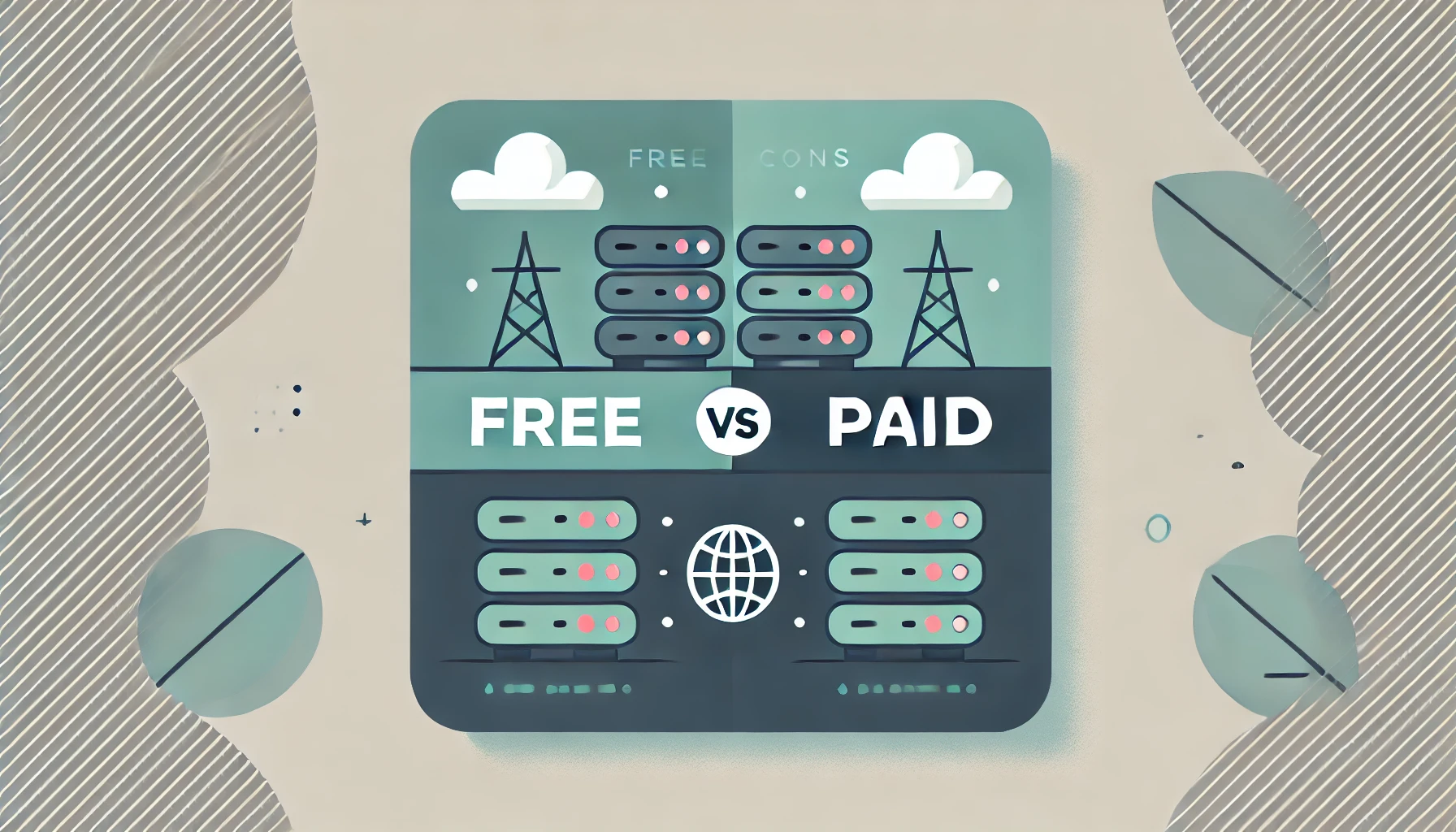Table of Contents:
- Introduction to Web Hosting
- What is Free Web Hosting?
- What is Paid Web Hosting?
- Comparing Free vs. Paid Web Hosting
- Advantages of Free Web Hosting
- Disadvantages of Free Web Hosting
- Advantages of Paid Web Hosting
- Disadvantages of Paid Web Hosting
- Factors to Consider When Choosing Free or Paid Hosting
- Free Web Hosting for Different Use Cases
- Paid Web Hosting for Different Use Cases
- Making the Decision: When to Choose Free vs. Paid Hosting
- Frequently Asked Questions
- Conclusion
1. Introduction to Web Hosting
- Define web hosting and its purpose for individuals, businesses, and organizations.
- Briefly introduce the two main types: free hosting and paid hosting.
- Explain why choosing the right hosting plan is crucial for website performance, credibility, and long-term growth.
2. What is Free Web Hosting?
- Describe free web hosting and the companies that typically offer it.
- Detail the resources typically available in free hosting (limited storage, bandwidth, basic customer support).
- Explain why free hosting exists, how hosting providers benefit from offering free plans, and how ads may be used to monetize these platforms.
3. What is Paid Web Hosting?
- Define paid web hosting and explain the types of paid hosting plans (shared, VPS, dedicated, cloud).
- Discuss the range of features offered in paid hosting (enhanced security, more storage, increased bandwidth, scalability, customer support).
- Explain why users pay for hosting and the benefits that come with investing in a paid plan.
4. Comparing Free vs. Paid Web Hosting
- Detailed comparison of free vs. paid hosting across various parameters, including:
- Performance and Speed: Discuss how limited server resources in free hosting impact site speed and performance.
- Storage and Bandwidth: Explain the limitations of free hosting, including reduced storage space and capped bandwidth.
- Customization and Control: Show the difference in customization options, from backend access to plugin installation.
- Reliability and Uptime: Analyze how paid hosting guarantees higher uptime and what this means for business sites.
- Support and Customer Service: Detail the contrast between limited support in free plans versus 24/7 premium support in paid hosting.
- Security: Outline the advanced security features typically available with paid hosting.
- Monetization: Explain the limitations of monetizing sites on free hosting due to ads or branding restrictions.
- Domain Name: Contrast using a custom domain in paid plans with subdomains often enforced in free hosting.
5. Advantages of Free Web Hosting
- Cost Savings: Free hosting requires no financial commitment.
- Easy to Set Up: Free hosting providers often offer simplified setups for beginners.
- Great for Testing and Experimentation: Free hosting is ideal for testing ideas, practicing coding, or trying out a basic site.
- Useful for Personal or Temporary Projects: For personal projects, free hosting is often sufficient.
- Availability of Basic Tools: Many free hosting services include website builders, templates, and beginner-friendly tools.
6. Disadvantages of Free Web Hosting
- Limited Resources: Free plans often have strict limitations on storage, bandwidth, and scalability.
- Lack of Customization: Many free hosts restrict backend access, limiting customization.
- Ads and Branding: Providers may place ads on your site, or your domain may have their branding (e.g.,
yourname.provider.com). - Unreliable Performance: Due to oversubscribed servers, free hosting can suffer from frequent downtime and slower speeds.
- Limited Customer Support: Free hosting generally offers minimal or community-based support, impacting troubleshooting.
7. Advantages of Paid Web Hosting
- Full Control and Customization: Paid hosting offers full control over the backend, allowing customization of databases, plugins, and themes.
- Higher Performance and Reliability: Paid plans provide dedicated resources, ensuring faster loading times and better uptime.
- Security Features: Advanced security features, such as SSL, DDoS protection, and regular backups, are commonly included.
- Professional Email: Many paid hosts offer professional email accounts with your domain.
- Scalability: Paid hosting is scalable, allowing your website to grow with your business needs.
- Quality Customer Support: Paid plans often come with 24/7 customer support, including live chat, phone, and email.
8. Disadvantages of Paid Web Hosting
- Cost: Paid hosting requires an ongoing financial commitment, with costs increasing as resources and features expand.
- Complexity for Beginners: Some paid hosting platforms require a learning curve for newcomers.
- Overpaying for Small Sites: Small, personal sites may not fully utilize the resources of paid plans, leading to unnecessary costs.
9. Factors to Consider When Choosing Free or Paid Hosting
- Evaluate factors like your website’s purpose, target audience, anticipated traffic, and security needs.
- Consider long-term growth potential and if you might eventually need the features of paid hosting.
- Budget constraints and business goals are important, particularly if your website serves a professional purpose.
10. Free Web Hosting for Different Use Cases
- Outline cases where free hosting is a good fit, such as:
- Personal blogs or hobby sites
- Temporary event or portfolio sites
- School projects or learning environments
- Test environments for development
11. Paid Web Hosting for Different Use Cases
- Provide examples where paid hosting is more appropriate:
- E-commerce websites
- Business sites requiring custom domains and branding
- Media-heavy sites (e.g., portfolios, galleries, streaming)
- Sites with growing traffic and security needs
12. Making the Decision: When to Choose Free vs. Paid Hosting
- Decision-making tips based on the purpose, projected growth, and budget for your site.
- Practical advice on transitioning from free to paid hosting as needs grow.
Summarize the benefits and limitations of both hosting types, highlighting the importance of choosing the right hosting plan based on your website’s goals and needs.

